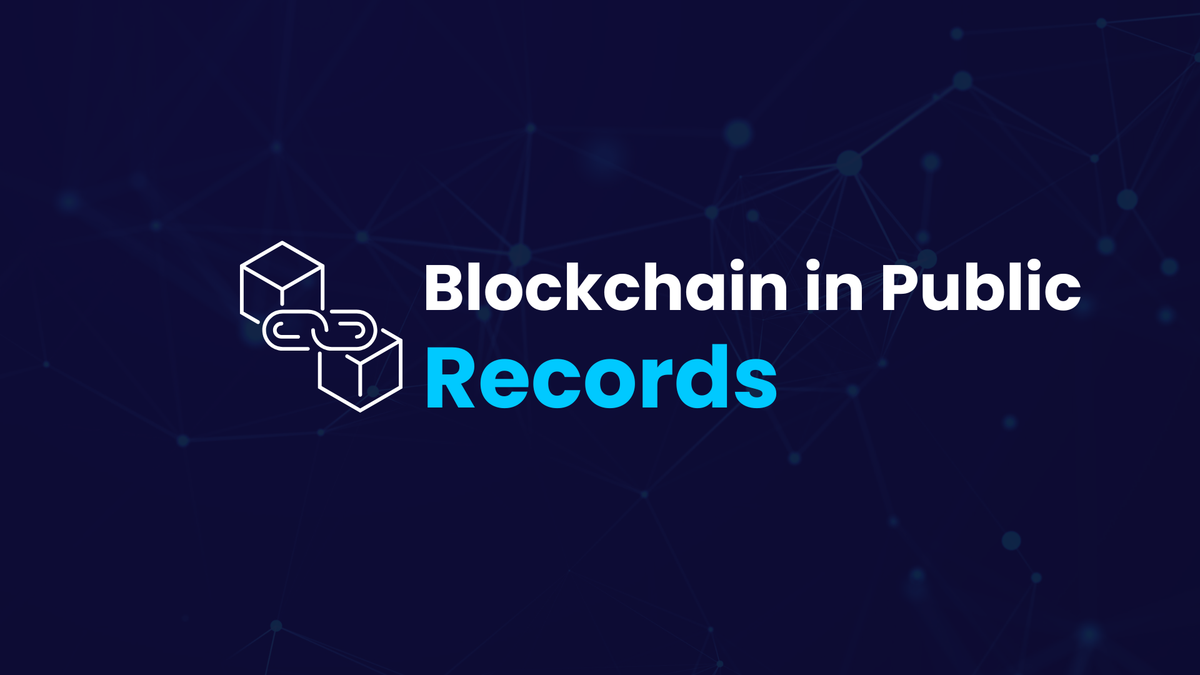Blockchain in Public Records

Introduction
Public records, encompassing documents like property deeds, birth certificates, and marriage licenses, are vital for maintaining transparency and accountability in governance. They serve as evidence of rights, entitlements, and actions, crucial for both citizens and government operations. Traditional management of these records, however, faces significant hurdles, including security risks, lack of transparency, and inefficiencies. Blockchain technology, initially recognized for its role in cryptocurrencies like Bitcoin, offers a transformative approach by providing a decentralized, distributed ledger system. This technology records transactions across a network of computers, ensuring security, transparency, and immutability, which are particularly beneficial for public records management.
Current Challenges in Public Records Management
The management of public records in traditional systems is fraught with several challenges:
- Centralization and Single Points of Failure: Centralized databases or physical archives are vulnerable to cyberattacks, natural disasters, or internal errors. A single breach can compromise the entire system, leading to data loss or unauthorized alterations.
- Security Risks: With the rise of digitization, the risk of data manipulation and unauthorized access has increased. Sensitive information, such as personal identification or property records, is at risk of fraud, eroding public trust.
- Lack of Transparency: Citizens often cannot independently verify the authenticity of public records, relying on government assurances, which can be problematic in cases of corruption or inefficiency.
- Inefficiencies: Manual processes, extensive paperwork, and reliance on intermediaries slow down record-keeping and retrieval, causing delays in services like property transfers or identity verification.
- Interoperability Issues: Different government agencies may use incompatible systems, hindering seamless data sharing and collaboration, which affects efficient governance.
These challenges highlight the need for a more robust system where blockchain technology offers promising solutions.
How Blockchain Addresses These Challenges
Blockchain's key features directly tackle the issues mentioned earlier, providing a paradigm shift in public records management:
- Decentralization: Operating on a distributed ledger, blockchain stores data across a network of nodes, eliminating single points of failure. This makes the system resilient to attacks and disasters, as data remains intact even if one node is compromised.
- Enhanced Security: Blockchain employs cryptographic hashing and consensus mechanisms, ensuring that once data is recorded, it cannot be altered without network consensus. This makes it extremely difficult for hackers to manipulate records, as any change would require altering every block across all nodes. According to the UCLA Law Review, blockchain can protect government records from data manipulation and ensure their longevity by making alterations nearly impossible without consensus.
- Transparency and Trust: Every transaction is recorded on an immutable ledger, visible to all participants. This transparency allows citizens to verify records independently, fostering trust. Real-time auditing capabilities ensure immediate detection of any changes, enhancing accountability.
- Efficiency through Automation: Smart contracts, self-executing codes with terms directly written into them, automate processes like data validation and record updates. This reduces the need for manual intervention, minimizing human errors and corruption.
- Interoperability: Blockchain can act as a common platform for different agencies to share and verify data, standardizing formats and storage. This facilitates seamless interaction between departments and jurisdictions, improving efficiency.
Case Studies and Real-World Examples
The application of blockchain in public records is not merely theoretical; several governments have implemented it with notable success:
- Sweden's Land Registry: Lantmäteriet, Sweden's land registry authority, is exploring blockchain to digitize real-estate transactions. Traditionally, property transfers take three to six months due to extensive paperwork. Using a blockchain-based mobile app, the process is expected to take a few days or even hours, recording detailed property information and transaction steps, increasing transparency and reducing paper documentation.
- Estonia's Government: Estonia is widely recognized as a pioneer in digital governance, integrating blockchain technology into various aspects of its public administration. The country's X-Road system facilitates secure data exchange between government agencies, incorporating blockchain elements to enhance security and transparency. While Estonia has leveraged blockchain-based solutions to secure data, its exploration of the technology began around 2012. One example is the E-Health Foundation, which uses blockchain to safeguard electronic health records. This ensures that any access or modification is permanently recorded, with real-time alerts for suspicious activity.
- Dubai's Land Department: Dubai has been a leader in blockchain adoption, particularly in real estate. The Dubai Land Department (DLD) has explored blockchain for property registration to enhance transparency, reduce fraud, and streamline processes. While Dubai launched the Dubai Blockchain Strategy in 2016 with ambitious goals, full implementation across all sectors has taken longer than initially expected. One of the key initiatives is the Real Estate Tokenization Project, which enables fractional ownership of properties using blockchain. This project aligns with Dubai’s broader vision of integrating blockchain into governance and economic sectors. Additionally, blockchain-based land registry platforms have been developed to improve security and efficiency.
Benefits and Potential Impact
The adoption of blockchain in public records management can yield significant benefits:
- Enhanced Trust: Citizens can independently verify records, reducing reliance on government assurances and strengthening trust in institutions.
- Cost Savings: Automating processes and reducing intermediaries lowers costs associated with record management, improving fiscal efficiency.
- Improved Data Integrity: The immutable nature of blockchain ensures records remain accurate and untampered, preserving their evidential value over time, crucial for legal and historical purposes.
- Efficient Service Delivery: Faster processing times for tasks like property transfers or identity verification enhance service delivery, reducing administrative burdens and improving citizen satisfaction.
Challenges and Limitations
Despite its potential, implementing blockchain in public records management faces several hurdles:
- Scalability: Current blockchain technologies may struggle with high transaction volumes required for large-scale systems. Solutions like sharding or layer-2 protocols are under development but not yet fully mature.
- Regulatory and Legal Hurdles: Existing laws may not accommodate decentralized systems, requiring updates to legal frameworks to ensure compliance and governance.
- Public Acceptance: Resistance from the public and government employees, due to lack of understanding or fear of change, can hinder adoption, necessitating education and awareness campaigns.
- Technical Expertise: Implementing and maintaining blockchain systems require specialized skills, which may be scarce in some regions, posing a barrier to widespread implementation.
Conclusion
Blockchain technology holds immense promise for transforming public records management by addressing centralization, security, transparency, and efficiency challenges. Real-world examples from Sweden, Estonia, and Dubai illustrate its practical benefits, enhancing trust, reducing costs, and improving service delivery. However, challenges like scalability, regulatory hurdles, and public acceptance must be addressed through ongoing research and policy development.
Key Citations
- Use Cases Blockchain for Public Records and Identity Verification
- Using blockchain to improve data management in the public sector
- Blockchain – security control for government registers
- Using Blockchain to Keep Public Data Public
- Blockchain and Public Record Keeping Of Temples Prisons and the ReConfiguration of Power
- Blockchain Technology and the Government Dealing With the Threat of Data Manipulation and Increasing Records Longevity
- https://academic.oup.com/policyandsociety/article/41/3/386/6566828?
- Dubai Land Department - Real Estate Tokenization
MITOSIS official links:
GLOSSARY
Mitosis University
WEBSITE
X (Formerly Twitter)
DISCORD
DOCS



Comments ()